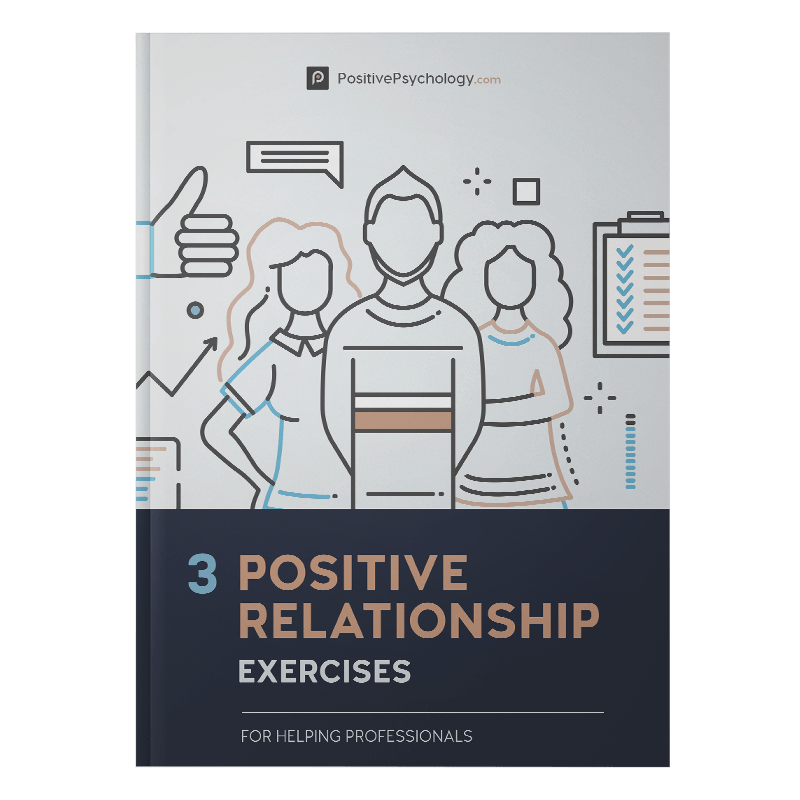Social Skills Support Groups: 10 Helpful Activities & Games
 Have you ever met someone brimming with confidence and communication skills, and thought to yourself, ‘I want to be like them‘?
Have you ever met someone brimming with confidence and communication skills, and thought to yourself, ‘I want to be like them‘?
Social skills can be like second nature, performed effortlessly by some. Other people struggle and feel awkward and out of place, with even basic skills.
This article will explain how well-planned group work can enhance social skills through games and role-play. Practice makes perfect.
Repeated exposure to these activities can support your clients to lead a more positive and fulfilling life in all life domains.
In this article, we will explain the advantages of social skills training in a group setting, ideas of how to support such a group, and various games and role-play activities.
Before you continue, we thought you might like to download our three Positive Relationships Exercises for free. These detailed, science-based exercises will help you or your clients build healthy, life-enriching relationships.
This Article Contains:
Social Skills Training in Groups Explained
Social skills training (SST) helps individuals improve their social behavior and interactions with others. These interventions focus on both verbal and nonverbal communication (Reichow & Volkmar, 2010).
SST is used in special education, Cognitive-Behavioral Therapy, and even relationship therapy (Beidel et al., 2014). Since SST is also often offered in groups, it begs the question:
How are these groups run precisely?
Key components of SST groups
There is not a standardized format for these training groups. They may comprise between two to six individuals. The groups can be focused on children, adolescents, or adults.
SST tends to last around 12 weeks but may be shorter or longer (Reichow, Steiner, & Volkmar, 2012).
SST groups have several facilitators, which may be psychologists, youth workers, counselors, therapists, or teaching staff. Parents or caregivers can also receive appropriate training to deliver skills to a younger group of children and adolescents (Reichow et al., 2012).
SST groups aim to teach positive social behaviors, verbal and nonverbal communication, interactions, and skills. The groups provide a caring environment where people can learn from encouragement, experience, and practice (Harrell, Mercer, & Derosier, 2009).
Social skills can be developed in the group sessions but should be practiced between sessions to enable success. Those attending the groups need to be willing participants.
SST involves many tasks and activities. There is often work around social competence, problem solving, perspective taking, discussion, friendship skills, theory of mind, and recognizing emotions (Dubreucq, Haesebaert, Plasse, Dubreucq, & Franck, 2021).
Setting up the group
Participants
The participants of an SST group can be anyone who is negatively affected by feeling different from others, such as an adult with mental health difficulties or a child with autism.
Group members need to be matched in terms of emotional, social, and behavioral needs. If the group members have individual areas of strength, they can act as positive models for other group members.
Time
The group needs to meet at a convenient day and time for all to attend. This should be on the same day each week. Routine helps to cement the importance of the group with a definite time and place in the weekly calendar.
Meeting place
The group needs to meet in a space solely for them, not shared with other activities. The venue should provide confidentiality and security, where the group must not be interrupted, watched by others, or overheard.
Setting up the room
The room needs to be set up in the same manner each time to avoid wasted time and distractions.
A circle of chairs should be organized for the group participants to sit. This enables a safe permeable space with an inside and an outside, allowing focus to shift from person to person.
Rules
A poster of the group rules should be displayed each week. Group members must decide on the rules so they feel they have ownership of them.
The consequences of breaking the rules should also be discussed and agreed upon with group members so they do not feel discriminated against if rules are applied.
Lesson Plans & Ideas for Support Groups

Each session of an SST group needs to be planned to ensure the group runs well and has a focus. If lessons are not well structured and don’t have a well-planned outline, then members may drop out.
Lessons plans and ideas can incorporate the following topics.
Importance of social skills
This lesson could outline how strong social skills can improve confidence, relationships, and friendships. Improved engagement in education, work, and recreational activities should also be shared in discussion.
The group can also discuss mental and physical health improvements. A short video can help the group understand the importance of good interpersonal skills.
Sharing
A lesson plan for learning how to share can be based on a brainstorming session on sharing. What does it look like or not look like? The group organizers can demonstrate real-life examples. This may include scenarios about sharing food, ideas, or books.
Scenarios about sharing passwords, revealing or embarrassing requests, and personal and sensitive information are also important. These will illustrate to group members what is not considered good sharing.
Taking turns
People who lack social skills may not understand appropriate turn taking. They may not know how to pay attention to what is going on.
This lesson plan can make use of a jigsaw puzzle and can be helpful for children and adolescents. Each person is given a piece of the puzzle, then they pay attention and wait their turn.
The same can be done with a question-and-answer debate for older groups. Each person is given a sticky note with a number indicating their turn to answer a question.
This lesson will emphasize manners, politeness, and eye contact. This can also be undertaken in role-play activities, discussed later.
Making friends
A lesson plan for teaching the concept of friendship can begin with a brainstorming session of good character traits valued in friends. Three small groups can be formed to do this. Their answers can be shared to note similarities and differences.
A discussion can take place about the role of friends in life. A good discussion point is also the importance of friends and why certain character traits in friends may not be good.
Group members can watch a video to highlight the importance of friendship.
Empathy
Empathy has an essential role in improving social skills and relationships with others (Bellet & Maloney, 1991). This lesson can focus on differentiating empathy from sympathy using psychological definitions.
This can be followed by a discussion of emotions and their importance in relationships.
Improving eye contact
Eye contact is an important aspect of nonverbal communication (Bellet & Maloney, 1991). Good eye contact helps to build relationships and pick up on nonverbal communication from others. It helps to keep the attention of others, too.
A suitable method for promoting eye contact in group sessions is to place a colored sticker between the eyebrows. This can be undertaken for all group members, drawing attention to the eyes of others when talking.
Understanding body language
A lesson focused on body language activities can be beneficial in improving social skills. In this lesson, group members can learn about cues that they can later master themselves.
Body language uses subtle skills (Tipper, Signorini, & Grafton, 2015). When it is lacking, it gives a signal of being uncommunicative.
One idea for an activity is a mismatch of behavior and emotion. The group facilitator can pick a somber topic and discuss this with a smile, laughter, and excitement. The group members may feel disturbed over such behavior teamed up with a sad topic. This activity can end with the group leader explaining that body language needs to match the mood.
5 Helpful Games & Activities
There are several fun therapy games and activities that can develop good social skills. These can be repeated again and again to improve your client’s confidence.
The blindfold walk
This is a fun game that can be played with all ages and groups. To do it, you’ll need a blindfold, several obstacles (chair, stool, table), open space to move in, and some musical instruments.
The group members work in pairs: a leader and a follower. The follower is blindfolded, and the leader guides them. The rest of the group makes noise with the instruments to guide the follower.
There should be no talking in this game. A different instrument sound will indicate a different way to walk (left, right, backward, or straight ahead). Adding a timing element to the task makes it even more exciting to see which couple finishes quicker.
As the couples have to work together, this game also promotes cooperation, active listening, problem solving, and trust in social interactions.
Introduction game
Introducing yourself to another person can be very anxiety provoking for someone with little confidence. People with poor social skills may not know how to do this. An introduction can be fun and build trust, a sense of identity, and belonging.
In the introduction game, all group members say their name followed by an action, such as two taps of the foot and a bow. Then the other members repeat the person’s name and the action. This continues (adding consecutive names and actions as you go, or not) until everyone has had a turn.
Two truths and a lie
Another easy group game involves each person telling two truths and one lie about themselves, such as ‘I was born in Germany; I love to eat spaghetti; I cycle 10 miles every week.’ Everyone else has to work out which statement is the lie.
Character analysis
The character analysis activity involves groups of three to four members discussing a character in a book or a movie. The group facilitator will provide the group with a book or a movie to watch and identify the character to discuss in smaller groups.
Group members will need to discuss the character’s traits, strengths, difficulties, and how the character changes over time. Each small group prepares a brief presentation that outlines how the character has demonstrated good and poor social skills and has (or hasn’t) improved.
You have something I would like
This activity involves requesting something. The activity can include group members being split into pairs.
One of the group members has an object, like a ball or a book. The other group member has to persuade the person with the object to give it to them. This activity focuses on using persuasion techniques, politeness, and compliments to gain the item. This activity allows group members to experience emotions involved in social interactions, such as pleasure, rejection, happiness, and sadness.
5 Role-Play Activities

Role-play is undertaken in a neutral environment and allows group members to test out a situation. Group members can consider different perspectives, develop empathy, solve problems, and explore new ideas.
The following five role-play activities can be used within groups to promote social skills. These are adapted from the social skills training program from the Center for Clinical Interventions for people with mental health difficulties.
Walking your dog
In this role-play, one group member pretends they are walking their dog and bumps into another dog walker they do not know. The two dogs appear to like each other. The first dog walker has to play an active role and ask questions of the second dog walker.
The facilitator can intervene when needed and ask open-ended questions to draw the conversation out. This activity shows group members how to start a conversation with new people and allows friendships to develop from new encounters.
Meeting an old friend
This role-play involves a group member going into a restaurant and seeing someone they have not seen for a long time. The other person asks if they would like a coffee, and then the two sit down to catch up.
The group member needs to ask questions about what the old friend has been doing since they saw them last. There will be a mix of good and bad news. This will test the group members’ listening skills and ability to hold a conversation, respond appropriately with empathy if there is bad news, and use paraphrasing skills.
Ability to say no
People with poor social skills often lack assertiveness (Ames, Lee, & Wazlawek, 2017). This role-play tests the ability to say no. The group member pretends a persuasive seller approaches them. This role-play tests the group members’ ability to refuse politely, resist persuasion, assert themselves, and leave the situation.
Plans for Friday night
This role-play involves planning to go out on Friday night with a friend, coordinating plans and weighing options. This activity tests listening skills and compromise when reaching an agreement.
Making friends in a new job
Another role-play practices initiating conversation and communication skills with an unfamiliar person using the ARE method: anchor, reveal, and encourage (Fleming, 2013).
This role-play concerns starting a new job and wanting to get to know colleagues and make friends. The group member imagines walking into work one morning and initiating conversation with a new colleague. The group facilitator can intervene with additional questions to combat silence.
Social skills everyone should know – Science of People
PositivePsychology.com’s Useful Tools
At the core of improving social skills is building positive relationships and increasing emotional wellbeing.
The Positive Relationships Masterclass is a powerful tool to help others move toward increasing their life satisfaction. Through this masterclass, you will learn about the fundamental principles of relationships and how to help others establish the key skills of building supportive connections with others.
If you have enjoyed reading this article, you may wish to look at Social Skills Training for Adults, an article that also has strategies and training ideas for developing social skills in adults. The article contains interesting videos and podcasts that can demonstrate social skills being tested out in different situations.
The Social Skills Training for Kids article can be beneficial if you are working with toddlers, children, or teenagers. It includes several lesson plans, activities, and online and board games you can use to enhance their social skills.
If you’re looking for more science-based ways to help others build healthy relationships, this collection contains 17 validated positive relationships tools for practitioners. Use them to help others form healthier, more nurturing, and life-enriching relationships.
The following social skills worksheets are also useful for improving social skills:
- Starting a Conversation – The ARE Method
Initiating conversations with new people can be difficult. The ARE method described earlier is a helpful way of doing this. This worksheet provides examples of how this method can be used to enhance a normal conversation. It can be incorporated into role-play and social skills lessons. - Different Ways to Say ‘No’ Politely
If you want to help clients who are struggling to assert themselves and say ‘no’, this is the ideal worksheet. It will help your clients practice setting boundaries and limits effectively.
A Take-Home Message
We often take social skills for granted, but it certainly does not seem like second nature to some. You may have recognized this in some of your clients.
All is not lost. They can be trained to learn these skills again, and with practice, your clients can experience a more fulfilling life.
This article has shown you how the supportive nature of SST groups can work wonders to facilitate growth and development and improve interpersonal connections.
After reading this article, I hope you agree that these groups are packed full of fun ideas, activities, and role-play. Clients, whether they are young or old, will thoroughly enjoy taking part in these groups. They are theatrical, and clients may see them more like pleasure and recreation than hard work.
We encourage you to explore some of these activities together with your clients. The games, role-play, and exercises will go far to create interesting sessional work and enable your clients to improve their quality of life.
We hope you enjoyed reading this article. Don’t forget to download our three Positive Relationships Exercises for free.
- Ames, D., Lee, A., & Wazlawek, A. (2017). Interpersonal assertiveness: Inside the balancing act. Social and Personality Psychology Compass, 11(6), 1–16.
- Beidel, D. C., Alfano, C. A., Kofler, M. J., Rao, P. A., Scharfstein, L., & Wong Sarver, N. (2014). The impact of social skills training for social anxiety disorder: A randomized controlled trial. Journal of Anxiety Disorders, 28(8), 908–918.
- Bellet, P. S., & Maloney, M. J. (1991). The importance of empathy as an interviewing skill in medicine. JAMA, 266(13), 1831–1832.
- Dubreucq, J., Haesebaert, F., Plasse, J., Dubreucq, M., & Franck, N. (2021). A systematic review and meta-analysis of social skills training for adults with autism spectrum disorder. Journal of Autism Developmental Disorder. Advance online publication.
- Fleming, C. (2013). It’s the way you say it: Becoming articulate, well-spoken and clear (2nd ed.). Berrett-Koehler.
- Harrell, A., Mercer, S., & Derosier, M. (2009). Improving the social-behavioral adjustment of adolescents: The effectiveness of a social skills groups intervention. Journal of Child and Family Studies, 18(4), 378–387.
- Reichow, B., Steiner, A. M., & Volkmar, F. (2012). Social skills groups for people aged 6 to 21 with autism spectrum disorders (ASD). Campbell Systematic Reviews, 8(1), 1–76.
- Reichow, B., & Volkmar, F. (2010). Social skills interventions for individuals with autism: Evaluation for evidence-based practices within a best evidence synthesis framework. Journal of Autism Developmental Disorder, 40, 149–166.
- Tipper, C. M., Signorini, G., & Grafton, S. T. (2015). Body language in the brain: Constructing meaning from expressive movement. Frontiers in Human Neuroscience, 9, 450.
Let us know your thoughts
Read other articles by their category
- Body & Brain (49)
- Coaching & Application (57)
- Compassion (26)
- Counseling (51)
- Emotional Intelligence (24)
- Gratitude (18)
- Grief & Bereavement (21)
- Happiness & SWB (40)
- Meaning & Values (26)
- Meditation (20)
- Mindfulness (45)
- Motivation & Goals (45)
- Optimism & Mindset (34)
- Positive CBT (28)
- Positive Communication (20)
- Positive Education (47)
- Positive Emotions (32)
- Positive Leadership (18)
- Positive Parenting (4)
- Positive Psychology (33)
- Positive Workplace (37)
- Productivity (16)
- Relationships (46)
- Resilience & Coping (36)
- Self Awareness (21)
- Self Esteem (38)
- Strengths & Virtues (32)
- Stress & Burnout Prevention (34)
- Theory & Books (46)
- Therapy Exercises (37)
- Types of Therapy (64)





What our readers think
My name is Huifang Xu, an associate professor (with Ph.D. degree) working for Faculty of Pre-school Education of Beijing Institute of Education, Beijing, China. Our college provides on-job training for teachers in Beijing (Please see my attached CV for more research background and skills..). My daily work is to provide professional support to kindergarten teachers for their professional development.
In kindergarten activities, there are always some children with emotional and behavioral problems. Many children’s problems are related to their family rearing environment. Kindergarten teachers hope to help these children as well as to communicate with their parents to support them, but they are short of ways. After reading the therapy skills in your website, I feel that they are exactly the strategies and skills that kindergarten teachers and parents need. I wish I could visit your center for one year to learn more about the therapy. I am sure that my further studies under your guidance will help me achieve my goals. After I finish my study schedule in U.S., I’ll come back to my college to help more teachers and parents.
I will appreciate it very much if you could give me your advice and consideration , and other relevant information
I am looking forward to hearing from you soon.
Sincerely yours,
Huifang Xu
Hi Huifang,
Thank you so much for your interest in furthering your skills alongside us 🙂 I’d suggest checking out this blog post to learn more about what we do and to get in touch by email if you’re interested in connecting with us.
Look forward to hopefully hearing from you!
– Nicole | Community Manager
very good- informative and also creative aspects
Thank you Sudeesh. I am glad you enjoyed this article!